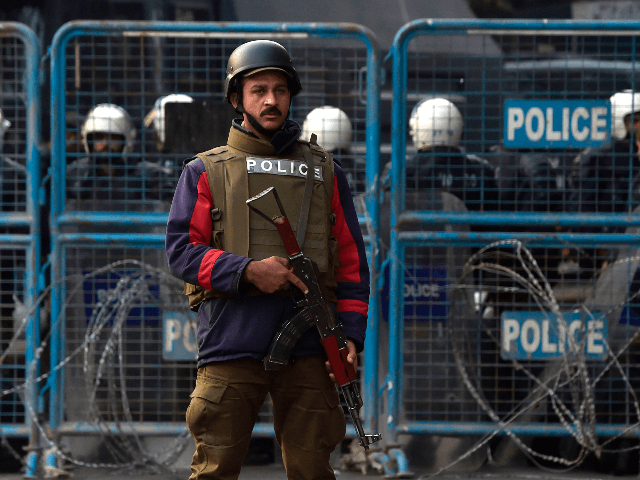Indian diplomats condemned the government of Pakistan on Tuesday for what they called the “institutionalized violation of human rights” in that country before the United Nations, where Pakistan sits on the Human Rights Council.
Pakistan became a member of the Human Rights Council last year, despite its extreme repression of religious minorities, particularly Christians and Ahmadi Muslims. “Blasphemy” against Islam is illegal in the country — blasphemy against Mohammed specifically is punishable by death — resulting in frequent, frivolous accusations of “blasphemy” against known local religious minorities. While Pakistan has never executed anyone for blasphemy, mob lynchings and assassinations of religious minority people are common.
Pakistan’s Islamist Prime Minister Imran Khan vowed last year that the country would use its position on the U.N. Human Rights Council to promote criminalization of “blasphemy” against Islam on a global scale. Khan has personally urged the U.N. General Assembly to outlaw criticism of Islam around the world during his remarks at its annual general debate session.
The Indian government condemned Pakistan’s poor human rights track record in a formal response to Pakistan’s condemnation of New Delhi before the United Nations. Pakistan and India have battled over control of the disputed territory of Kashmir since their founding as sovereign states; India regularly accuses Pakistan of allowing jihadist terrorist organizations to operate within its borders. Under Khan, Pakistan has escalated its criticism of India’s policies regarding Muslims in Kashmir. Khan himself has repeatedly compared counterpart Narendra Modi to Adolf Hitler and his ruling Hindu nationalist party, the BJP, as “Nazis.”
“Pakistan’s deliberate misuse of this august forum for its malicious propaganda against India, aimed at diverting the attention of the Council from its own serious violations of human rights, has remained a constant,” top Indian diplomat in Geneva Pawankumar Badhe wrote on Tuesday. Badhe’s statement rejected Pakistan’s accusations against India of inappropriate behavior in Kashmir and accused Pakistan of truly violating the spirit of the Human Rights Council.
“Pakistan, a country in dire economic situation, will be well advised to stop wasting time of the Council and its mechanisms, stop state-sponsored cross-border terrorism and end institutionalised violation of human rights of its minority and other communities,” Badhe wrote. “The members of this Council are well aware that Pakistan has provided pensions to dreaded and listed terrorists out of State funds and has the dubious distinction of hosting the largest number of terrorists proscribed by the United Nations … it has become a factory for producing terrorists.”
The Indian missive described terrorism as “the worst form of human rights abuses and the supporters of terrorism [as] the worst abusers of human rights.”
It later noted Pakistan’s poor record of protecting religious minorities.
“The Council should ask Pakistan why the size of its minority communities such as Christians, Hindus, and Sikhs has drastically shrunk since independence,” the statement read, “and why they and other communities such as Ahmadiyyas, Shias, Pashtuns, Sindhis, and Baloch, have been subjected to draconian blasphemy laws, systemic persecution, blatant abuses and forced conversions. Holy and ancient sites of religious minorities in Pakistan have been attacked and vandalized daily.”
Pakistan’s legal system labels the state an Islamic institution, governed by Islamic law. Ahmadi Muslims, who believe that Mirza Ghulam Ahmad, an Indian man born in 1835, was the promised Messiah of Islam, are explicitly excluded from government protections for Muslims and specifically discriminated against in seemingly irrelevant legal provisions. For example, all Pakistanis must declare Ahmadis “infidels” on government paperwork to receive passports and be able to leave the country. Ahmadis face extreme violence from their Sunni Muslim compatriots, including regular assassinations.
The government of Pakistan recently attempted to prosecute two Ahmadi American citizens for running the official website of the Ahmadi Muslim community in the United States.
Christians also face extreme persecution in the country, particularly from Muslim neighbors. Pakistani police regularly attack Christians when locals complain of alleged blasphemy violations. Pakistani police also often look away when local mobs organize violent attacks, including lynchings, of churches and homes of known Christian people.
Pakistan’s one major contribution to the U.N. Human Rights Council was a resolution passed last year condemning “blasphemy.” Pakistan received a co-sponsorship from the Philippines for its “promotion of interreligious and intercultural dialogue” resolution, meant to promote “respect for religious symbols.”
“The adoption of this resolution by the UN General Assembly is part of Pakistan’s diplomatic efforts inter alia for raising awareness about Islamophobia and countering the defamation of sacred religious personalities and symbols,” the Pakistan Foreign Ministry said at the time.
While Pakistan suffers from extreme religious persecution, neighboring India is also an inhospitable environment for Christians. Unlike Pakistan, the main threat against Christians in India is Hindu nationalists, who consider Christianity a foreign religion no ethnic Indian should adhere to.
“Christians are persecuted in all areas of public and private life, and anti-conversion laws (currently in nine states, with more considering adoption) are abused to harass and intimidate Christians,” the Christian aid group Open Doors revealed in a report published in January.

COMMENTS
Please let us know if you're having issues with commenting.